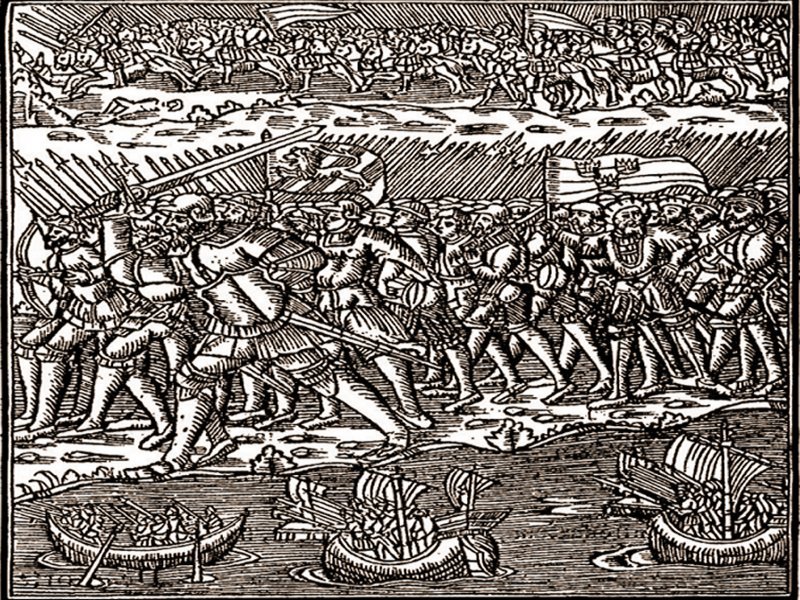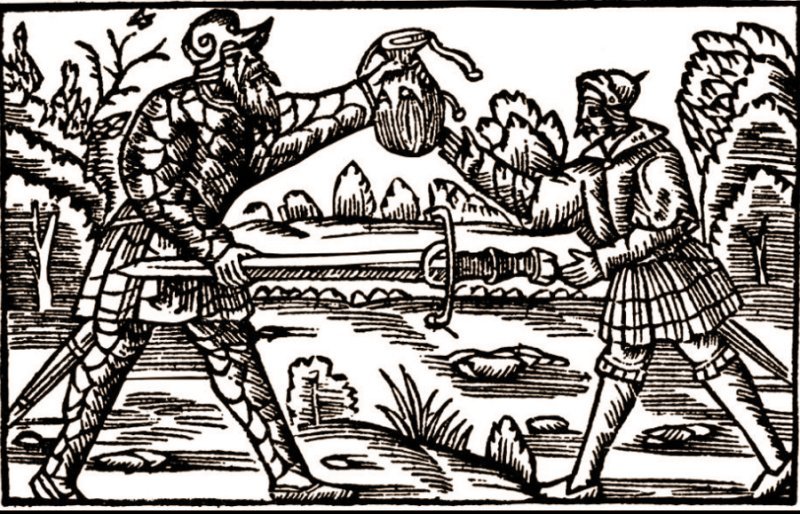Starkad The Viking – Legendary Norse Hero Who Was Both Blessed And Cursed By Gods
A. Sutherland - AncientPages.com - Starkad, also known as Starkodder, is an Old Norse hero from several ancient legends that portray him as a great warrior who performed heroic deeds and committed notorious crimes.
Starkad leads Geats (the banner with a lion) and Swedes (the banner with three crowns) in battle against the Danes, from Olaus Magnus' Historia de gentibus septentrionalibus (1555). Credit: Public Domain
"Blessed by Odin, cursed by Thor, Starkad is doomed to wander the world for three lifespans, committing a criminal deed in each. Hated by the people, loved by murderers and tyrants, he seeks only peace, but his destiny is endless war…" writes Gavin Chappell in his book 'Starkad the Viking.'
There may have been several different heroes with the same name, but basically, there are two individuals named Starkad.
One of them was the descendant of giants with six or eight arms. Another Starkad, who had the last name Aludreng, was the grandfather of the most famous Starkad.
Aludreng was a divine hero and the foster son of Odin, the Norse god of war and magic. Starkad was of half-giant descent, and already, as a child, like the Jotuns living in Jötunheimr, he had a higher nature than ordinary humans usually have.
Under the training and by the magic of his master, Horsehair Beard (Hroszharsgrani), Starkad gained great learning and heroic bravery and was also gifted with a human form and manly beauty.
Starkad in battle, from Olaus Magnus' Historia de gentibus septentrionalibus (1555). Credit: Public Domain
Next, after the famous Sigurd Fafnirsbane, Starkad is believed to be the greatest champion of heroic legends, also mentioned by Saxo (1150/1160 -1206), a Danish historian and author (nicknamed Grammaticus), and in several ancient tales.
Odin helped raise the young Starkad, but he desired to remain anonymous. One day, his master took a boat and sailed away with him to an unknown island, where the young Starkad witnessed an assembly of eleven men sitting upon thrones. However, one throne was empty until the great Odin entered the assembly hall and sat on the vacant throne. Starkad immediately recognized his foster father. His master, Horsehair Beard (Hroszharsgrani), was the great god Odin.
The Meeting Began, And Thor Said:
"Alfhild, Starkad's mother, chose a giant as a father for her child; therefore, I decree that he be childless, the last of his race."
Then Odin said that he grants Starkad a life three times the length of mortal man," and at the same time, Thor answered: "I destine him to do in each age a grievous outrage that shall be a work of shame and dishonor in the eyes of man."
Starkad arranges his own demise, from Olaus Magnus' A Description of the Northern Peoples (1555). Credit: Public Domain
Odin immediately replied: "And I bestow on him the stoutest armor and most precious garments."
"I forbid him," said Thor, "both house and home, nor shall a piece of land be ever his."
"And I allot him gold and flocks in fullest plenty," answered Odin.
"Then I doom him to ever-growing thirst for gold and wealth, that he may never enjoy peace of mind."
Odin returned, "I confer on him valor and prowess and victory in battle."
"Yet shall he from each combat bear a wound that reaches to the very bone," was Thor's reply, which was yet another curse, and so the two gods continued.
"The noble lore of the skalds shall be his," continued his protector, "that he may sing, and each of his words shall be a song."
"His memory shall be cursed with forgetfulness of all that he has sung."
"The noblest and the best among men shall love and honor him," spake Odin. Thos responded with his last powerful curse: "But all his tribe shall shun and hate him."
And so it was decided, and Starkad – a subject of Odin's good feelings and Thor's bad ones - became privileged and disfavored many times in his long life, full of good and bad deeds.
The Mighty Thunder God, Thor, Hated Starkad
The mighty thunder god, Thor, hated Starkad, a favorite of Odin. Odin gave the young warrior many blessings, including wealth, battleship successes, invulnerability, great wealth, and excellent skills as a poet. On the other hand, Thor contradicted all these gifts because he intentionally wanted to hurt the hero. On one occasion, Odin wished to honor the bravery of the warrior Starkad, but Thor wanted to harm the hero.
 Part of the Carta Marina of 1539 by Olaus Magnus, depicting the location of magnetic north vaguely conceived as "INSVLA MAGNETV[M]" (Latin for "Island of Magnets")off the modern city Murmansk. The figure of a man holding the rune staffs is the Norse hero Starkad. The rune staffs are inscribed "Starcaterus" (left) and "pugil Sueticus" (right) in runes. Date 1539, Source: "Carta Marina"; Author Olaus Magnus
Part of the Carta Marina of 1539 by Olaus Magnus, depicting the location of magnetic north vaguely conceived as "INSVLA MAGNETV[M]" (Latin for "Island of Magnets")off the modern city Murmansk. The figure of a man holding the rune staffs is the Norse hero Starkad. The rune staffs are inscribed "Starcaterus" (left) and "pugil Sueticus" (right) in runes. Date 1539, Source: "Carta Marina"; Author Olaus Magnus
This unique treatment of Starkad caused him to be seriously injured in every battle, never enjoy his riches, and never get anyone to know and appreciate his poetry.
Starkad was often portrayed as gray-haired, deformed, and very old. His life was much longer than that of ordinary people. He had successes and committed infamous deeds, including killing the king whom he had earlier served with much honor.
A Tragedy Planned As 'False' Sacrifice
On a Viking raid with King Vikar of Norway, according to Gautreks Saga, strong winds overtook the fleet, and they had to seek shelter in a protected bay. The hurricane continued for many days, and no prayers and sacrifices were able to help. It was a sign that Odin demanded a real sacrifice - a human life.
Suddenly, Horse-hair Beard (Odin) in a broad-brimmed hat appeared the night before Starkad, giving him a reed and a thin willow branch. The hero understood Odin's will, and the next day, he informed Vikar and his counselors that the gods would be satisfied with the mere show of a sacrifice.
He explained that the king was to suffer the slender branch to be laid around his neck; they were then to tie him to the thin bough of a tree and touch him with the reed. Thus, the sacrifice would be accomplished, and Odin would again send them favorable winds.
Vikar accepted this proposal, and when the ritual was almost performed, the thin bough of the tree sprang upwards, the willow branch was changed into a rope, and the reed Starkad flung at the king was suddenly turned into a spear, which pierced the victim to the heart.
A supposedly mock sacrifice became the murder of King Vikar at Odin's request. However, in Icelandic legends, this killing is portrayed as unintended. It was one of Starkad's shameful deeds.
Death Of Starkad, The Viking
Starkad's life involved successes, blessings, and crimes.
He also received many wounds, some very serious, but he survived because his life was very long. But one day, it was enough. Even a hero must sooner or later die.
As in Snorre Sturluson's Icelandic kings, the real heroes deserve a natural death. Starkad also arranged his demise, for it was considered disgraceful for those who engaged in war professions to die in sickness in ancient times.
He found his killer, gave him a sack of money, and handed over his sword. Then he bowed his neck and received a deadly blow.
Updated on December 31, 2023
Written by – A. Sutherland - AncientPages.com Senior Staff Writer
Copyright © AncientPages.com All rights reserved. This material may not be published, broadcast, rewritten or redistributed in whole or part without the express written permission of AncientPages.com
Expand for referencesOlaus Magnus, History of the Nordic Peoples , ed., Robert Geete et al., Ed., John Granlund (2001)
Nordisk familjebok - Uggleupplagan. 26. Slöke – Stockholm
Wagner, Asgard and the Gods
Gavin Chappell, 'Starkad the Viking'
Berggren, Anne Marie, ed., Male and Immortal in a Historical Perspective
More From Ancient Pages
-
 Ancient Mysteries Of Japan – Remarkable Story Of An Unknown Civilization And Lost Knowledge – Part 2
Civilizations | Sep 2, 2019
Ancient Mysteries Of Japan – Remarkable Story Of An Unknown Civilization And Lost Knowledge – Part 2
Civilizations | Sep 2, 2019 -
 Ancient Secrets Of Polish Ciemna Cave Inhabited By Humans 120,000 Years Ago
Featured Stories | Nov 22, 2016
Ancient Secrets Of Polish Ciemna Cave Inhabited By Humans 120,000 Years Ago
Featured Stories | Nov 22, 2016 -
 Unusual Stone Carvings And Medieval ‘Witching’ Marks To Ward Off Evil Spirits Discovered In England
Archaeology | Oct 29, 2020
Unusual Stone Carvings And Medieval ‘Witching’ Marks To Ward Off Evil Spirits Discovered In England
Archaeology | Oct 29, 2020 -
 4,000-Year-Old Village Mentioned In Ancient Texts Unearthed Near Sacred City Of Varanasi
Archaeology | Mar 13, 2020
4,000-Year-Old Village Mentioned In Ancient Texts Unearthed Near Sacred City Of Varanasi
Archaeology | Mar 13, 2020 -
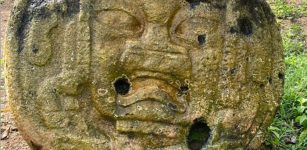 Two Huge Olmec Reliefs Recovered After Anonymous Tip
Archaeology | Aug 9, 2022
Two Huge Olmec Reliefs Recovered After Anonymous Tip
Archaeology | Aug 9, 2022 -
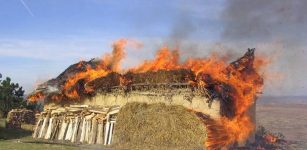 Mysterious Cucuteni-Tyrpillian Culture Burned Their Settlements For Unknown Reasons
Civilizations | Feb 12, 2021
Mysterious Cucuteni-Tyrpillian Culture Burned Their Settlements For Unknown Reasons
Civilizations | Feb 12, 2021 -
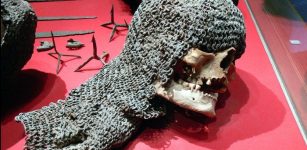 On This Day In History: Battle Of Visby, Gotland Was Fought – On July 27, 1361
News | Jul 27, 2016
On This Day In History: Battle Of Visby, Gotland Was Fought – On July 27, 1361
News | Jul 27, 2016 -
 Something Surprising Happened With Temperature Since The Start Of The Holocene – New Study
Archaeology | Oct 10, 2022
Something Surprising Happened With Temperature Since The Start Of The Holocene – New Study
Archaeology | Oct 10, 2022 -
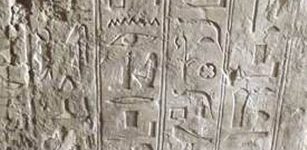 Tomb of the 26th dynasty vizier of Upper Egypt discovered in South Assassif, Luxor
Civilizations | Aug 31, 2015
Tomb of the 26th dynasty vizier of Upper Egypt discovered in South Assassif, Luxor
Civilizations | Aug 31, 2015 -
 Did Human Nature’s Dark Side Help Us Spread Across The World?
Archaeology | Nov 25, 2015
Did Human Nature’s Dark Side Help Us Spread Across The World?
Archaeology | Nov 25, 2015 -
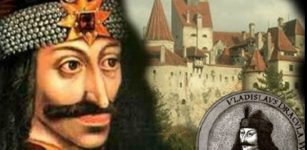 On This Day In History: Vlad III Dracula Regained Throne Of Wallachia For The Third Time – On Nov 26, 1476
News | Nov 26, 2016
On This Day In History: Vlad III Dracula Regained Throne Of Wallachia For The Third Time – On Nov 26, 1476
News | Nov 26, 2016 -
 On This Day In History: Riot Over Wine In Oxford – On Feb 10, 1355
News | Feb 10, 2017
On This Day In History: Riot Over Wine In Oxford – On Feb 10, 1355
News | Feb 10, 2017 -
 During Tough Times Ancient ‘Tourists’ Sought Solace In Florida Oyster Feasts
Archaeology | May 4, 2020
During Tough Times Ancient ‘Tourists’ Sought Solace In Florida Oyster Feasts
Archaeology | May 4, 2020 -
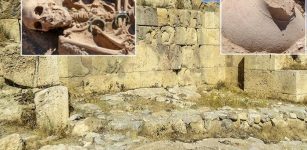 Urartian Noble Woman Buried With Jewelry Found In 2,750-Year-Old Necropolis Of Çavuştepe Castle
Archaeology | Sep 10, 2020
Urartian Noble Woman Buried With Jewelry Found In 2,750-Year-Old Necropolis Of Çavuştepe Castle
Archaeology | Sep 10, 2020 -
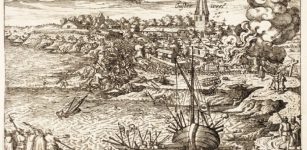 On This Day In History: Battle of Oosterweel Was Fought – On Mar 13, 1567
News | Mar 13, 2017
On This Day In History: Battle of Oosterweel Was Fought – On Mar 13, 1567
News | Mar 13, 2017 -
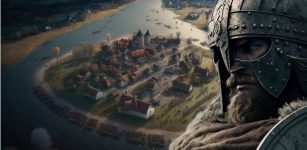 Has The Legendary Viking Stronghold Jomsborg Finally Been Found?
Archaeology | Jun 3, 2023
Has The Legendary Viking Stronghold Jomsborg Finally Been Found?
Archaeology | Jun 3, 2023 -
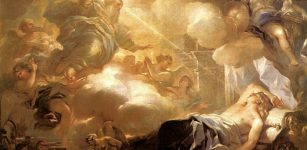 King Solomon’s Magical Shamir Could Cut Through Any Stone – Proof Of Advanced Ancient Technology?
Featured Stories | Aug 23, 2018
King Solomon’s Magical Shamir Could Cut Through Any Stone – Proof Of Advanced Ancient Technology?
Featured Stories | Aug 23, 2018 -
 Ancient Babylonian Astronomical Records Confirm Slowing Of Earth’s Spin
Archaeology | Dec 20, 2016
Ancient Babylonian Astronomical Records Confirm Slowing Of Earth’s Spin
Archaeology | Dec 20, 2016 -
 Stunning Reconstruction Of Caterthun Iron Age Forts In The Grampian Mountains, Scotland
Civilizations | Nov 17, 2016
Stunning Reconstruction Of Caterthun Iron Age Forts In The Grampian Mountains, Scotland
Civilizations | Nov 17, 2016 -
 Giant Pre-Hispanic Jar Used To Make Mexican Traditional Corn Beer
Archaeology | May 6, 2020
Giant Pre-Hispanic Jar Used To Make Mexican Traditional Corn Beer
Archaeology | May 6, 2020

